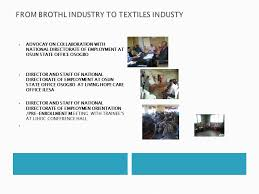THE RELENTLESS COMBAT AGAISNT THE EPIDEMIC HIV/AIDS DISEASE
implementation and support
Human Resources: Project staff lacks capacity on project coordination and administration. They were unable to capture data/report as expected.
Office infrastructure has depreciated
Supply of testing kit was inadequate: Increasing demand for HIV testing and in ability to meet the demand
Experiment organizations that sent volunteer to Nigeria have remove Nigeria from their list due to security situation
Collegial Relationship
LIHOC has good working relationship with tertiary institutions and expertise on HIV issues in Nigeria. They provide technical assistance for us in achieving our goal. Rarely, do we not have conversation with them in a month and their inputs have gone a long way in our project implementation and resource mobilization.
Capacity building of LIHOC and Partners: Within the first year of 2013 (which is the first year of two years project), partners have received various basic skills in HIV/AIDS issues and this has helped them to do their work accordingly and also to reach out to over five thousand (11770) most at risk populations, which is 80% of two years target.
Access to HIV prevention strategies: the fantastic and thrilling radio-media outreach has helped to reach beyond boundaries as people come from other states seeking for information on HIV/AIDS and reproductive health services (counseling). Trained Peer educators are committed at various secondary schools of intervention both in Osun and Cross River states.
Access to positive living: Since the inception of ART in Nigeria in 2002, Ilesa and its environs have being thirsty for ART centre at the secondary facility level which was established this year 2013 through the support of FHI,HYGEIA ,APIN and IHVN in collaboration with the Nigeria government in three of our project site Iwo, Ilesa and Ijebu-jesa.
LIHOC work in two states and in 6 communities with following achievement;
Integrations of HIV testing and counseling (HTC) help women know their HIV status improve their knowledge and increase their protective behaviors, particularly among those who test HIV-positive in grass root community it is a form of scaling up PMTCT program.
In Nigeria with generalized epidemics, LIHOC introduced rapid expansion of provider-initiated HIV testing and counseling in maternal-newborn-child health (MNCH) settings, and particularly antenatal care has been an effective way of increasing uptake of PMTCT services. LIHOC introduced routine offer of HIV testing in 2008 and within six (6) years, the proportion of pregnant women tested for HIV increased from 10% to 98%. Scaling up efforts for PMTCT has started to show an impact, with the proportion of HIV-positive pregnant women receiving antiretroviral treatment for PMTCT increasing from 2% in 2008 to 99% in 2015 (more than 97% increase). This benefits both the health of these mothers and also prevents HIV transmission to their children during pregnancy and breastfeeding under this project.
Mass media intervention has tremendously helped to address a range of related health effects, using behavioral change communication strategies.


